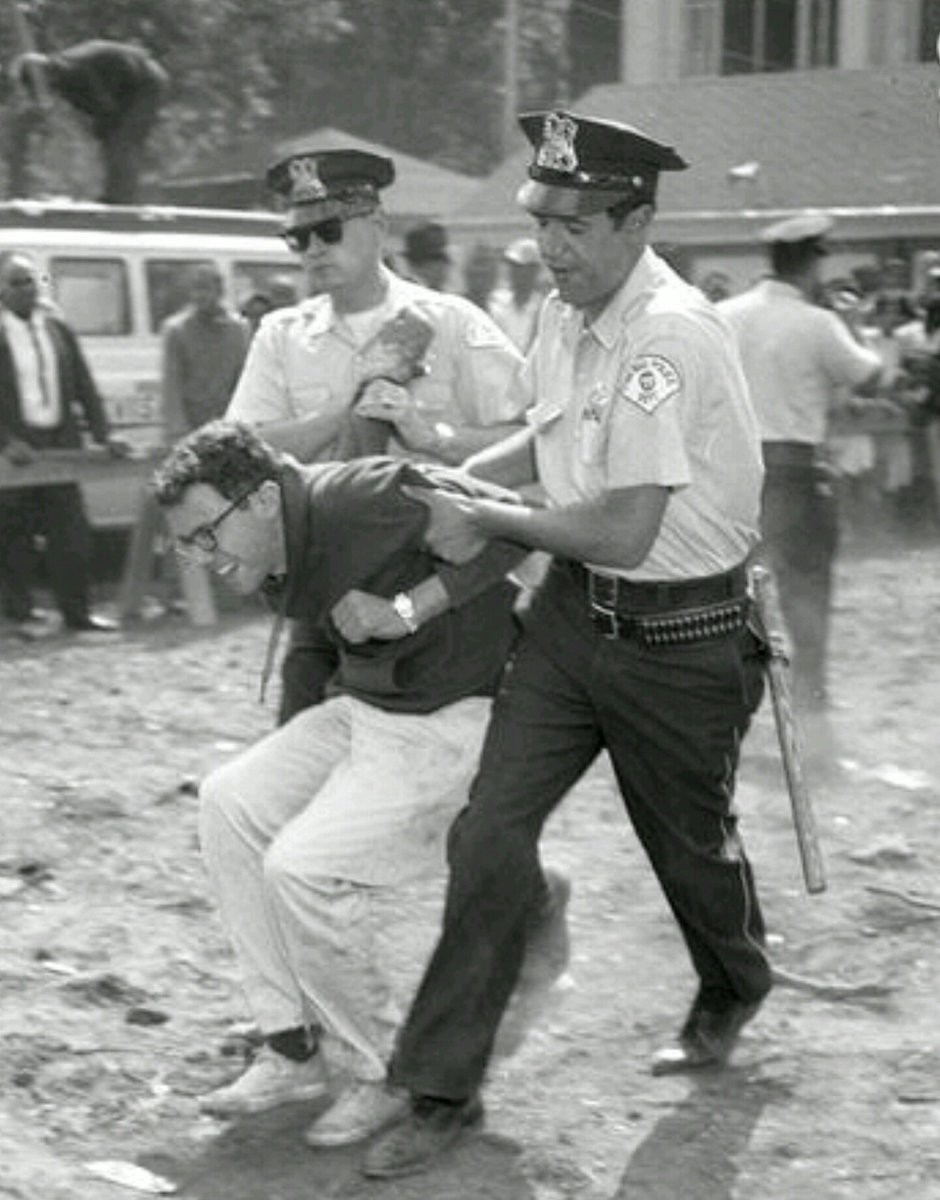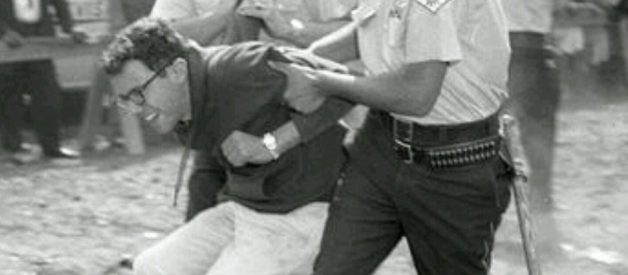 Bernie Sanders Getting Arrested Protesting Civil Rights, 1963
Bernie Sanders Getting Arrested Protesting Civil Rights, 1963
?But we are sick and tired of hearing your songTelling how you were gonna change right from wrong?Cause if you really want to hear our views,You haven?t done nothin.??- Stevie Wonder, ?You Haven?t Done Nothin??
Senator Bernie Sanders officially launched his campaign for president in Brooklyn last Saturday, where he and his surrogates, most notably campaign chairwoman Nina Turner and journalist/activist Shaun King (who both supported him in 2016), highlighted his legacy of civil rights activism as a reason why he should lead the country.
King cited Sanders?s experience as a student activist at University of Chicago in the 1960s, telling the audience that he is ?the last activist from the Civil Rights Movement with a chance to become President.? Turner, who spoke of his endorsement for Reverend Jesse Jackson?s 1988 presidential campaign, said of Sanders that ?He has shown throughout his life his measure.?
Dogged by criticism that he did not focus enough on racial issues during his last campaign, it appears that Sanders, aided by his surrogates, is rebranding himself as a champion of civil rights to win over voters of color. However, this strategy overlooks decades of missteps in reaching out to black voters, as well as numerous troubling statements he has made about race since the last election, up to and including just yesterday.
Sanders?s Civil Rights History
During the early 1960s, when he was a student at the University of Chicago, Sanders participated in civil rights protests and activism. He served on the commission to de-segregate off-campus housing as part of CORE (Congress of Racial Equality). He led a protest to de-segregate a local Howard Johnson?s restaurant in 1962. He attended the March on Washington in 1963, and that same year, he was charged with resisting arrest during a desegregation protest, for which he was fined $25.00. He reportedly attended so many protests that his grades suffered, and he was told by his dean to take time off.
However, the paper trail on Sanders?s civil rights activism runs out after his 1964 move to Vermont, a state that is currently 95% white. He has an anemic track record enacting Senate legislation, and of the few bills he has introduced, none have concerned civil rights. In an article in Vanity Fair, CNN?s Bakari Sellers asked, ?What has Bernie Sanders done about civil rights since the 60s? Other than vote for the crime bill in 1994?I?m hard-pressed to see how he makes inroads with black voters, given the fundamental misconceptions he has about the intersection of race and economics.?
During the 2016 campaign, black leaders in the state claimed they were ?invisible? to Sanders when he was their representative in Congress. Curtiss Reed Jr., executive director of the Vermont Partnership for Fairness and Diversity, recalled asking Sanders about race during his first Senate campaign in 2006, and said he shut down his questions because they didn?t have to do with income inequality. Other black leaders, like Shaman Mouliert and Vaughn Carney, expressed disappointment in his lack of attention towards race-related issues. Following Sanders?s testy confrontation with Black Lives Matter protestors at Netroots Nation in 2015, Reed wrote in an open letter to the Senator:
?Stop talking about your experience in the civil rights movement of five decades ago like a proud Eagle Scout showing off his merit badges. Focus not on your past but on the actions you must undertake to address racial injustice today in the proud tradition of Vermont senators past and present.?
It became clear Sanders was lagging with African-Americans when, in February 2016, Hillary Clinton defeated him in the critical South Carolina primary by 47 points. She went on to win every other Southern state, sometimes by as much as 66 points (as she did in Mississippi), because of her support from African-Americans and people of color (black women in particular.) These victories gave her an insurmountable lead in delegates by the end of March, drastically undercutting his odds of winning the nomination.
Sanders?s Surrogates Undermine His Credibility on Race-Related Issues
Going into 2020, Sanders wants to prove to black voters that he has their best interests at heart. Unfortunately, choosing Shaun King and Nina Turner to deliver this message on his behalf sends mixed signals.
King, who rose to prominence covering the shooting of Michael Brown in Ferguson, Missouri, is a highly controversial figure in the black community. He has been accused of misappropriating funds for the numerous social justice organizations he has started (as well as failing to provide receipts for them) and stealing from the work of black women. He goes nuclear on anyone who criticizes him for these transgressions or suggests that he is not acting in good faith. Last January, he threatened to sue activist Clarissa Brooks for tweeting about his fundraising. When he tagged her in one of his tweets, his followers turned her mentions into a dumpster fire. Brooks refused to apologize, saying she ?would not be made to bend to his will for the sake of his ego.?
Turner is a former Ohio State Senator who switched from supporting Clinton to Sanders in 2016, then refused to endorse her after the convention (she was even asked to be Jill Stein?s running mate, which she turned down.) As the head of the Sanders-related organization Our Revolution, which fields and supports progressive candidates for office, Turner has been criticized for using the group to raise her own profile, and for making decisions without consulting other members. Last year she tried to install her friend Tezlyn Figaro as Chief of Staff, despite the fact that Figaro had no experience in political organizing. Even worse, Figaro had been on Fox News praising Trump and making inflammatory remarks about illegal immigrants. The board overruled this decision, and Figaro was dismissed from the group soon after.
Can Sanders Evolve on Civil Rights?
Although Sanders?s speeches in Brooklyn and Chicago last weekend showed a willingness to emphasize civil rights in his campaign, his interview yesterday on the radio program The Breakfast Club showed that he still has a long way to go to win over the black voters he needs to be a viable candidate.
A crucial talking point in this primary so far has been reparations for descendants of slaves. Candidates like Elizabeth Warren and Kamala Harris have expressed willingness to enacting it in some form if elected. However, in both his CNN town hall and his appearance on The View last week, Sanders declined to support it, claiming, ?Right now, our job is to address the crises facing the American people in our communities?and I think there are better ways to do that than just writing out a check.?
When Breakfast Club host Charlamagne Tha God asked why he was ?dodging? a direct answer on reparations, Sanders replied, ?What do we mean by reparations??To my mind, it means that we have to deal with the fact that there is enormous disparity between the black community and the white community.?
?I think they mean some type of economic empowerment to African descendants of slaves,? Charlamagne said. ?Cash payouts? Why don?t you agree with that??
?Just a check to every African-American? Well then, there?s a check for every Native American,? he said, comparing the oppression of both groups at the hands of the United States. He continued:
?I think the way we go forward is to build America together. There are distressed white communities, there are distressed Latino communities?Right now what you have is a government owned and controlled by big money interests?we?re going to change that, and we?re going to pay attention to the needs of working families and low-income families in a way in which you?ve never seen.?
If Sanders had done his research, he would know that reparations can take many forms beyond just ?a check to every African-American?: they can also include forgiving student loans, or making good on the Reconstruction promise of ?40 acres and a mule.? Instead, he pivoted to talking about income inequality across all groups ? an economic version of ?all lives matter.?
A few minutes later, Sanders went back to talking about his activism in the Civil Rights Movement and his support for Rev. Jackson. ?I have a long history in civil rights activism,? he boasted. ?If you look at my record in terms of civil rights?you will find that it is consistently a very, very strong one.?
?Any legislation you can point to?? Charlamagne asked.
?Legislation that benefits African-Americans?? Sanders replied.
He took a brief pause and answered: ?Not specifically.?


